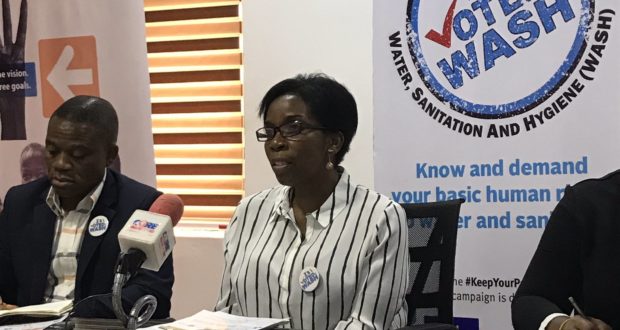WaterAid Nigeria and the National Water Resources Institute (NWRI) have signed a three-year partnership to deliver equitable sustainable total sanitation at scale in Nigeria.

The partnership will combine the water, sanitation, and hygiene expertise of WaterAid and the training expertise of the NWRI to improve and systemically support sector capacity for sanitation programme design and development in Nigeria.
In 2018, to address Nigeria’s water, sanitation and hygiene crisis, the Federal Government declared a state of emergency in the sector and called on all state governments to take action to end open defecation by 2025. A National Action Plan to revitalise the sector and a national sanitation campaign tagged “Clean Nigeria: Use the Toilet” were launched to address the particularly grim sanitation crisis and deliver an open defecation free Nigeria by 2025.
However, institutional and capacity gaps, particularly related to the designing, planning and implementation of rural sanitation programmes in Nigeria, continue to threaten the achievement of these plans which will not be realised without the right context-specific sanitation approaches and accompanying capacities to implement sanitation programmes in rural communities of Nigeria.
Over the years, rural sanitation programming has shifted from construction-driven approaches towards social mobilisation and behavioural change approaches; with market-based approaches gaining momentum. Although these innovations have been important steps forward, they have resulted in mixed outcomes and shown that applying a blueprint of single approaches across large areas or even countries, does not always work and is simply not enough to reach everyone, everywhere.
Additionally, the cost of facilitating and delivering sanitation approaches is often not well-understood or monitored. Fast-tracking progress requires a new way of thinking and planning for rural sanitation. To address this, WaterAid collaborated with Plan International UK and UNICEF to develop guidance on programming for rural sanitation for programme policymakers, planners and implementers, outlining how to design an equitable and sustainable rural sanitation programme at scale.
The partnership between WaterAid and NWRI is set to bridge knowledge and capacity gaps and contribute to strengthening sector capacity for improved sanitation in the country. It will promote learning and capacity building on rural sanitation in Nigeria, working through a systems-based approach to embed the principles and approaches to enhance sustainability, equity and scale towards universal access by 2030.
Additionally, it will review and integrate the emerging framework for rural sanitation promotion in Nigeria, and integrate learnings from WaterAid’s implementation of the Bill & Melinda Gates Foundation-funded Sustainable Total Sanitation (STS) project with the Rethinking Rural Sanitation (RRS) guidelines to develop and deliver modules and certified short courses on the RRS and STS emerging framework training guides. A pilot of the course has commenced at the NWRI alongside the MOU signing.
Through technical assistance and capacity building, targeted at frontline agencies and implementers of sanitation development programmes in Nigeria, this partnership will not only contribute to delivering the sanitation pillar of the National Action Plan but also to the realisation of Sustainable Development Goal 6 in Nigeria.
Evelyn Mere, WaterAid Country Director, said: “Despite slight progress nationally, Nigeria ranks first among countries globally with the highest population of people defecating in the open and we still have 112 million without access to basic sanitation. This abysmal state of sanitation has adverse effects on health, livelihoods, education, gender equality, and socio-economic development. Yet, the goal of the National Action Plan, to end open defecation by 2025 and attain universal access to water supply, sanitation and hygiene by 2030, continues to be challenged by significant institutional and capacity gaps.
“A multi-partner approach is crucial to realising the overall objectives and goal of the National Action Plan to revitalise the water, sanitation and hygiene sector and through this partnership, key drivers in the sanitation sector will gain relevant knowledge in sanitation approaches targeted at delivering equitable and sustainable results at scale.
“In 2019, at the World Water Week in Stockholm, WaterAid entered into a partnership with the Government of Nigeria, through the Ministry of Water Resources, to provide technical assistance and capacity strengthening support to stimulate sector actors towards achieving the longer-term goals of the National Action Plan – which are to ensure universal access to sustainable and safely managed WASH services for every Nigerian by 2030 and to institutionalise the enabling environment required to support the effective and sustainable management of Nigeria’s WASH services. That commitment has influenced and informed our strategy and approach in working with the Federal Government and it has also led us here, to this moment.
“Nigeria is of such global importance that achieving progress on water, sanitation and hygiene in Nigeria will have a transformational impact on water, sanitation and hygiene access at a global scale. The stark realities around us are more than enough indication that we simply cannot afford to continue with the status quo. We must take urgent action to accelerate Nigeria’s progress or face a worsening crisis with real effects on human lives. We must, by every means possible, move Nigeria’s development forward, improve access to basic sanitation and end open defecation.”
